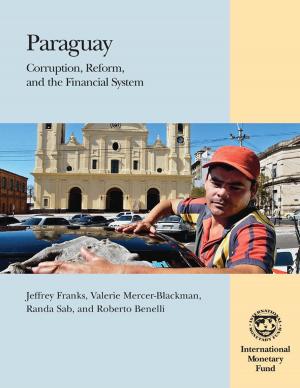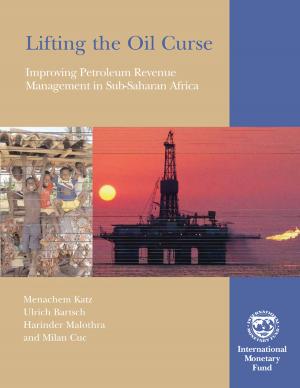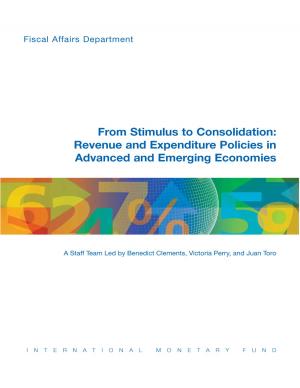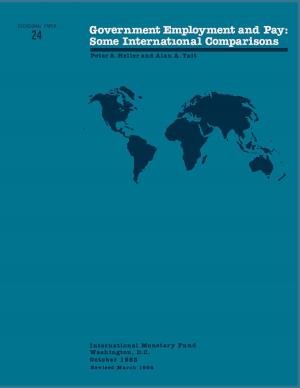International Monetary Fund imprint: 1365 books
by Ana Ms. Corbacho, Katja Funke, Gerd Mr. Schwartz
Language: English
Release Date: July 3, 2008
Language: English
Release Date: July 3, 2008
The need to upgrade public infrastructure, improve the delivery of public services, and explore new options for partnering with the private sector is being increasingly recognized. While this has created important new business opportunities for the private sector, it has also given rise to new challenges...
by Kevin Mr. Fletcher, Sanjeev Mr. Gupta, Duncan Mr. Last
Language: English
Release Date: April 22, 2008
Language: English
Release Date: April 22, 2008
The international community has committed to scaling up aid and improving aid delivery to low-income countries to help them meet the Millennium Development Goals. Other "emerging" donors, public and private, are increasing their assistance, and debt-relief initiatives are creating space...
by Yongzheng Yang, Robert Mr. Powell, Sanjeev Mr. Gupta
Language: English
Release Date: March 20, 2006
Language: English
Release Date: March 20, 2006
Over the next decade, African countries are expected to be the largest beneficiaries of increased donor aid, which is intended to improve their prospects for achieving the Millennium Development Goals. This handbook will help these countries assess the macroeconomic implications of increased aid and...
by Eric Mr. Le Borgne, Katherine Ms. Baer
Language: English
Release Date: July 29, 2008
Language: English
Release Date: July 29, 2008
Tax amnesties remain as popular as ever as a tool for raising revenue and increasing tax compliance. International experience, however, shows that the costs of tax amnesty programs often exceed the programs’ benefits. This paper weighs the advantages and disadvantages of tax amnesties, drawing on...
by Jeffrey Mr. Franks, Randa Miss Sab, Valerie Ms. Mercer-Blackman
Language: English
Release Date: September 7, 2005
Language: English
Release Date: September 7, 2005
Following some historical background, this paper describes how corruption is manifested in Paraguay. The paper distinguishes between factors that explain the growth performance of Paraguay since 1960 (where corruption does not directly enter as a significant factor) and factors that explain the relative...
by Harinder Mr. Malothra, Milan Mr. Cuc, Ulrich Mr. Bartsch
Language: English
Release Date: January 23, 2004
Language: English
Release Date: January 23, 2004
How can a country turn oil revenues into a blessing rather than a curse? With growing international interest in new offshore oil deposits in sub-Saharan Africa, there is also greater scrutiny of the reasons why many oil-producing countries in the region have experienced disappointing economic performance...
by M. Mr. Cangiano, Barry Anderson, M. Mr. Alier
Language: English
Release Date: April 28, 2006
Language: English
Release Date: April 28, 2006
Public-private partnerships (PPPs) refer to arrangements under which the private sector supplies infrastructure assets and infrastructure-based services that traditionally have been provided by the government. PPPs are used for a wide range of economic and social infrastructure projects, but they are...
by Benedict Mr. Clements, Juan Mr. Toro R., Victoria Perry
Language: English
Release Date: October 6, 2010
Language: English
Release Date: October 6, 2010
This paper identifies policy tools that could be used for fiscal consolidation in advanced and emerging economies in the years ahead. The consolidation strategy, particularly in advanced countries, should aim to stabilize age-related spending in relation to GDP, reduce non-age-related expenditure...
by Eduardo Mr. Borensztein, Olivier Mr. Jeanne, Paolo Mr. Mauro
Language: English
Release Date: January 26, 2005
Language: English
Release Date: January 26, 2005
The debate on government debt in the context of possible reforms of the international financial architecture has thus far focused on crisis resolution. This paper seeks to broaden this debate. It asks how government debt could be structured to pursue other objectives, including crisis prevention, international...
by Alan Mr. Tait, Peter Mr. Heller
Language: English
Release Date: October 31, 1983
Language: English
Release Date: October 31, 1983
How many people are employed by the government? How many are employed by the central government compared with the state and local authorities? How many are employed in public enterprise? How much are they all paid? How much are they paid relative to each other, or relative to the private sector? Such...
by Antonio Mr. Spilimbergo, Alessandro Mr. Prati, Jonathan Mr. Ostry
Language: English
Release Date: October 15, 2009
Language: English
Release Date: October 15, 2009
This volume examines the impact on economic performance of structural policies-policies that increase the role of market forces and competition in the economy, while maintaining appropriate regulatory frameworks. The results reflect a new dataset covering reforms of domestic product markets, international...
by Milan Mr. Cuc, Erik Mr. Lundbäck, Edgardo Mr. Ruggiero
Language: English
Release Date: January 19, 2006
Language: English
Release Date: January 19, 2006
Labor migration and remittances, which have increasingly become a part of the global landscape, have profound economic and social consequences. Moldova, a small low-income country where an estimated one-third of the economically active population has been working abroad, is an interesting illustration...
by Tamim Mr. Bayoumi, Hamid Mr. Faruqee, Douglas Mr. Laxton
Language: English
Release Date: November 30, 2004
Language: English
Release Date: November 30, 2004
Over the past two years, the IMF staff has been developing a new multicountry macroeconomic model called the Global Economy Model (GEM). This paper explains why such a model is needed, how GEM differs from its predecessor model, and how the new features of the model can improve the IMF’s policy...
by E. Mr. Gelbard, Corinne Deléchat, Ejona Ms. Fuli
Language: English
Release Date: June 26, 2015
Language: English
Release Date: June 26, 2015
This paper analyzes the persistence of fragility in some sub-Saharan African states and the multiple dimensions of state weakness that are simultaneously at play. This study also provides an overview of the analytics of fragility, conflict, and international engagement with fragile states before turning...













